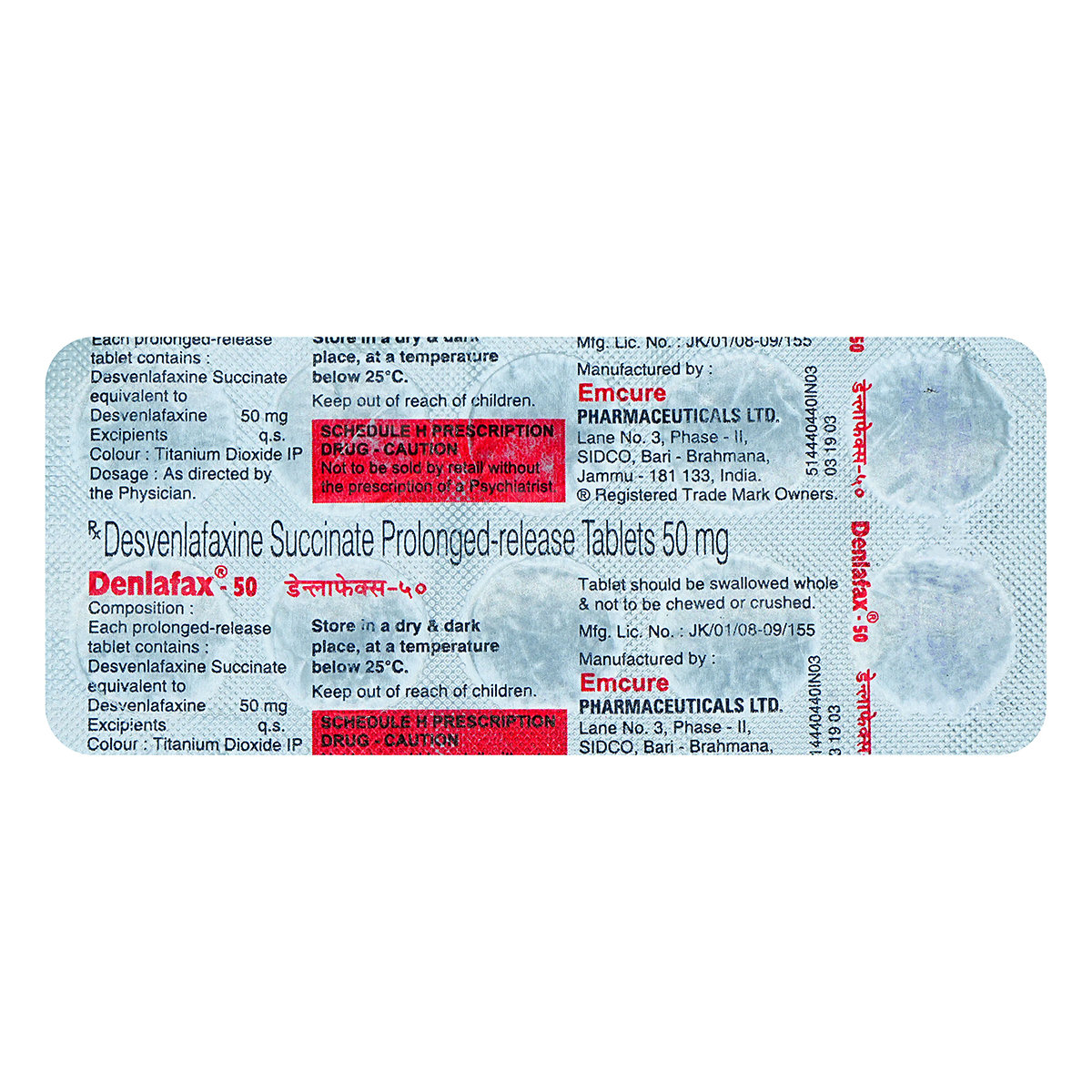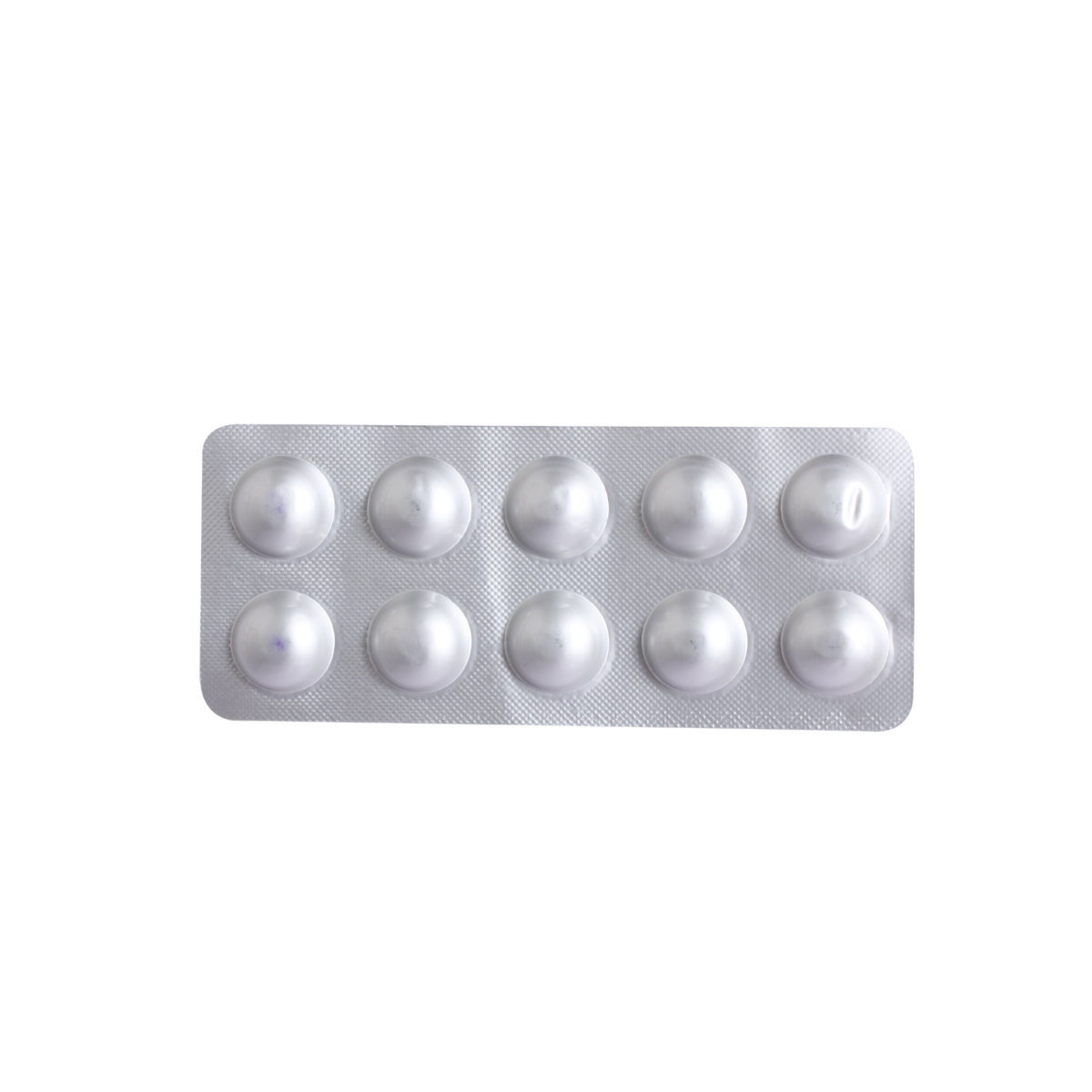Desvenlafaxine
About Desvenlafaxine
Desvenlafaxine belongs to a group of medications called 'antidepressants' used to treat a major depressive disorder (depression). Major depressive disorder, also known as clinical depression, is a mental health disorder characterised by a persistent and intense feeling of sadness for an extended duration of time. Symptoms include sadness, loss of interest, appetite changes, sleep problems, restlessness, lack of energy, feeling worthless or guilty, thoughts of harming oneself, difficulty concentrating, making decisions, and thinking.
Desvenlafaxine contains desvenlafaxine, which works by increasing the levels of certain chemical messengers (serotonin and norepinephrine) in the brain. This maintains mental balance and helps in regulating mood, and treats depression.
You are advised to take Desvenlafaxine for as long as your doctor has prescribed it for you, depending on your medical condition and response to the treatment. In some cases, you may experience certain common side-effects such as nausea, dizziness, insomnia (sleep problems), constipation, sleepiness, loss of appetite, anxiety and male sexual dysfunction disorders. Talk to your doctor if you experience these side-effects persistently.
Please do not stop taking Desvenlafaxine suddenly, as it might cause withdrawal symptoms. Consult your doctor immediately if you have suicidal thoughts, such as killing or harming yourself. Consult your doctor if you are pregnant or breastfeeding. Avoid driving as Desvenlafaxine may cause sleepiness and dizziness. Desvenlafaxine should not be given to children as safety and effectiveness have not been established. Avoid consuming alcohol along with Desvenlafaxine as it could lead to increased sleepiness and dizziness. Keep your doctor informed about your health condition and medicines to rule out any side-effects.
Uses of Desvenlafaxine
Medicinal Benefits
Desvenlafaxine belongs to a group of antidepressant medicines indicated for the treatment of a major depressive disorder. Desvenlafaxine works by increasing the levels of certain chemical messengers (serotonin and norepinephrine) in the brain. This maintains mental balance and helps in regulating mood, and treats depression.
Directions for Use
Storage
Side Effects of Desvenlafaxine
- Nausea
- Dizziness
- Insomnia (sleeplessness)
- Constipation
- Sleepiness
- Loss of appetite
- Anxiety
- Sweating
- Erectile dysfunction
Drug Warnings
Do not take Desvenlafaxine if you are allergic to any of its contents; if you are taking linezolid, intravenous methylene blue, other serotonergic agents, monoamine oxidase inhibitors (MAOI) or have taken them in the last 14 days. Inform your doctor before taking Desvenlafaxine if you have heart problems, hypotension, bipolar disorder, glaucoma, epilepsy, lung or breathing problems, bleeding problems, or low sodium levels in the blood. Consult your doctor immediately if you have suicidal thoughts, such as killing or harming yourself. Consult your doctor if you are pregnant or breastfeeding. Desvenlafaxine should not be given to children as safety and effectiveness have not been established. Avoid consuming alcohol along with Desvenlafaxine as it could lead to increased sleepiness and dizziness.
Drug Interactions
Drug-Drug Interactions: Desvenlafaxine may interact with antipsychotic (aripiprazole, lurasidone, quetiapine), CNS stimulant (amphetamine/dextroamphetamine, phentermine, lisdexamfetamine), an antidepressant (amitriptyline, bupropion, duloxetine, escitalopram, sertraline, trazodone, venlafaxine), anti-convulsant (clonazepam, lamotrigine, pregabalin), skeletal muscle relaxant (cyclobenzaprine), pain killer (ibuprofen, tramadol), anti-anxiety (alprazolam), an antihistamine (cetirizine).
Drug-Food Interactions: Avoid consuming alcohol along with Desvenlafaxine as it may increase dizziness and sleepiness. Avoid taking St. John’s wort (herbal supplement used to treat depression) along with Desvenlafaxine as it may cause serotonin syndrome.
Drug-Disease Interactions: Inform your doctor if you have urinary tract obstruction, glaucoma, high blood pressure, seizures, renal disease, mania, or hyponatremia (low levels of sodium).
Drug-Drug Interactions Checker List:
Safety Advice

Alcohol
unsafeAvoid consumption of alcohol while taking Desvenlafaxine as it may cause increased sleepiness and dizziness.

Pregnancy
cautionDesvenlafaxine belongs to pregnancy category C. Please consult your doctor if you are pregnant or planning for pregnancy, your doctor will prescribe only if the benefits outweigh the risks.

Breast Feeding
cautionDesvenlafaxine may pass into breastmilk. Consult your doctor before taking Desvenlafaxine your doctor will decide whether Desvenlafaxine can be taken by breastfeeding mothers or not.

Driving
unsafeDesvenlafaxine causes sleepiness and dizziness. Do not drive or operate machinery.

Liver
cautionDose adjustment may be needed in patients with liver impairment. Please consult your doctor if you have a liver impairment or any concerns regarding this.

Kidney
cautionDose adjustment may be needed in patients with kidney impairment. Please consult your doctor if you have kidney impairment or any concerns regarding this.

Children
unsafeDesvenlafaxine should not be given to children as safety and effectiveness have not been established.
Habit Forming
Diet & Lifestyle Advise
- Maintain a healthy diet and exercise regularly as it helps in improving overall health and boosts self-esteem.
- Regularly attend therapy sessions.
- Perform meditation and yoga. This helps in relieving stress and provides relaxation.
- Follow a regular sleep pattern to improve the amount and quality of sleep you get.
- Include foods rich in omega-fatty acids such as fish, nuts, fresh fruits, vegetables and olive oils.
- Amino acid-rich foods such as meat, dairy products, and certain fruits and vegetables help in the proper maintenance of neurotransmitters.
- Complex carbohydrates help in stimulating serotonin (a feel-good neurotransmitter). These include whole grains, legumes, spinach, broccoli, oranges and pears.
- Exercising helps in the production of the body’s natural antidepressants. It also helps in relieving stress, improves mood, boosts self-esteem, and provides restful sleep.
- Avoid smoking and alcohol consumption.
- Learn about your condition, understand the risk factors and follow the doctor’s treatment plan.
Special Advise
- Do not stop taking Desvenlafaxine suddenly as it might cause withdrawal symptoms.
- Consult your doctor immediately if you have suicidal thoughts such as killing or harming yourself.
- Talk to your doctor right away if you notice any unusual bleeding or bruising.
Patients Concern
Disease/Condition Glossary
Major depressive disorder: Major depressive disorder, also known as clinical depression, is a mental health disorder characterised by a persistent and intense feeling of sadness for an extended duration of time. It mainly impacts mood, behaviour, and other physical functions, such as sleep and appetite. Symptoms include sadness, loss of interest, appetite changes, sleep problems, restlessness, lack of energy, feeling worthless or guilty, thoughts of harming oneself, difficulty in concentrating, making decisions, and thinking. The exact cause of depression is unknown. However, factors such as stress, changes in hormone levels, alcohol or drug abuse, abuse during childhood, certain medical conditions and medications might increase the risk of developing depression.
FAQs
Desvenlafaxine works by increasing the levels of certain chemical messengers (serotonin and norepinephrine) in the brain which maintain mental balance, thereby regulating mood that treats depression.
Do not discontinue Desvenlafaxine without consulting your doctor, as it could lead to withdrawal symptoms. To treat your condition effectually, continue taking Desvenlafaxine for as long as prescribed. Do not be reluctant to speak with your doctor if you feel any difficulty while taking Desvenlafaxine.
Desvenlafaxine may cause decreased sex-drive (libido), problems with ejaculation and orgasm. Consult your doctor if you have any concerns regarding this.
Hypertension should be controlled before starting treatment with Desvenlafaxine. Therefore, consult your doctor if you have high blood pressure. Regular monitoring of blood pressure levels is advised while taking Desvenlafaxine.
Desvenlafaxine may increase the chances of bleeding and bruising. The risk increases when Desvenlafaxine is taken along with painkillers and blood thinners. Consult your doctor if you notice unusual bleeding or bruising.
When taken along with other medicines, Desvenlafaxine may cause rare but potentially life-threatening condition called serotonin syndrome. This condition causes changes in how the brain, blood vessels, muscles and digestive system work. Avoid taking Desvenlafaxine along with MAOI’s (used to treat depression), linezolid, intravenous methylene blue and other serotonergic agents.
Desvenlafaxine may dilate your pupils (widen the dark centres of your eyes). This can trigger a glaucoma attack. Before taking Desvenlafaxine, consult your doctor if you have glaucoma.
Desvenlafaxine may cause seizures. If you’ve ever had a seizure, tell your doctor before taking Desvenlafaxine.




